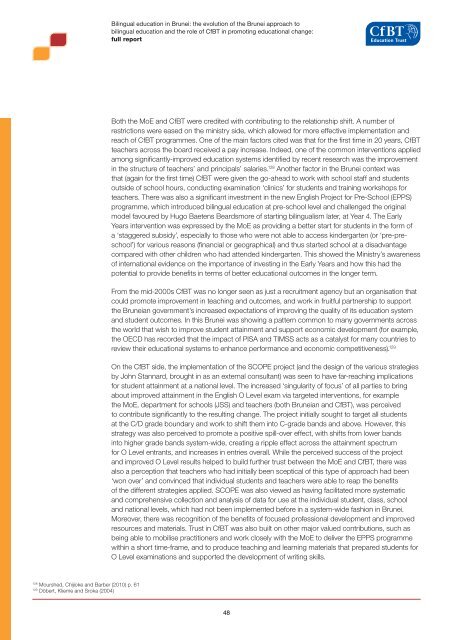r-brunei-full-2014
r-brunei-full-2014
r-brunei-full-2014
You also want an ePaper? Increase the reach of your titles
YUMPU automatically turns print PDFs into web optimized ePapers that Google loves.
Bilingual education in Brunei: the evolution of the Brunei approach to<br />
bilingual education and the role of CfBT in promoting educational change:<br />
<strong>full</strong> report<br />
Both the MoE and CfBT were credited with contributing to the relationship shift. A number of<br />
restrictions were eased on the ministry side, which allowed for more effective implementation and<br />
reach of CfBT programmes. One of the main factors cited was that for the first time in 20 years, CfBT<br />
teachers across the board received a pay increase. Indeed, one of the common interventions applied<br />
among significantly-improved education systems identified by recent research was the improvement<br />
in the structure of teachers’ and principals’ salaries. 128 Another factor in the Brunei context was<br />
that (again for the first time) CfBT were given the go-ahead to work with school staff and students<br />
outside of school hours, conducting examination ‘clinics’ for students and training workshops for<br />
teachers. There was also a significant investment in the new English Project for Pre-School (EPPS)<br />
programme, which introduced bilingual education at pre-school level and challenged the original<br />
model favoured by Hugo Baetens Beardsmore of starting bilingualism later, at Year 4. The Early<br />
Years intervention was expressed by the MoE as providing a better start for students in the form of<br />
a ‘staggered subsidy’, especially to those who were not able to access kindergarten (or ‘pre-preschool’)<br />
for various reasons (financial or geographical) and thus started school at a disadvantage<br />
compared with other children who had attended kindergarten. This showed the Ministry’s awareness<br />
of international evidence on the importance of investing in the Early Years and how this had the<br />
potential to provide benefits in terms of better educational outcomes in the longer term.<br />
From the mid-2000s CfBT was no longer seen as just a recruitment agency but an organisation that<br />
could promote improvement in teaching and outcomes, and work in fruitful partnership to support<br />
the Bruneian government’s increased expectations of improving the quality of its education system<br />
and student outcomes. In this Brunei was showing a pattern common to many governments across<br />
the world that wish to improve student attainment and support economic development (for example,<br />
the OECD has recorded that the impact of PISA and TIMSS acts as a catalyst for many countries to<br />
review their educational systems to enhance performance and economic competitiveness). 129<br />
On the CfBT side, the implementation of the SCOPE project (and the design of the various strategies<br />
by John Stannard, brought in as an external consultant) was seen to have far-reaching implications<br />
for student attainment at a national level. The increased ‘singularity of focus’ of all parties to bring<br />
about improved attainment in the English O Level exam via targeted interventions, for example<br />
the MoE, department for schools (JSS) and teachers (both Bruneian and CfBT), was perceived<br />
to contribute significantly to the resulting change. The project initially sought to target all students<br />
at the C/D grade boundary and work to shift them into C-grade bands and above. However, this<br />
strategy was also perceived to promote a positive spill-over effect, with shifts from lower bands<br />
into higher grade bands system-wide, creating a ripple effect across the attainment spectrum<br />
for O Level entrants, and increases in entries overall. While the perceived success of the project<br />
and improved O Level results helped to build further trust between the MoE and CfBT, there was<br />
also a perception that teachers who had initially been sceptical of this type of approach had been<br />
‘won over’ and convinced that individual students and teachers were able to reap the benefits<br />
of the different strategies applied. SCOPE was also viewed as having facilitated more systematic<br />
and comprehensive collection and analysis of data for use at the individual student, class, school<br />
and national levels, which had not been implemented before in a system-wide fashion in Brunei.<br />
Moreover, there was recognition of the benefits of focused professional development and improved<br />
resources and materials. Trust in CfBT was also built on other major valued contributions, such as<br />
being able to mobilise practitioners and work closely with the MoE to deliver the EPPS programme<br />
within a short time-frame, and to produce teaching and learning materials that prepared students for<br />
O Level examinations and supported the development of writing skills.<br />
128<br />
Mourshed, Chijioke and Barber (2010) p. 61<br />
129<br />
Döbert, Klieme and Sroka (2004)<br />
48


